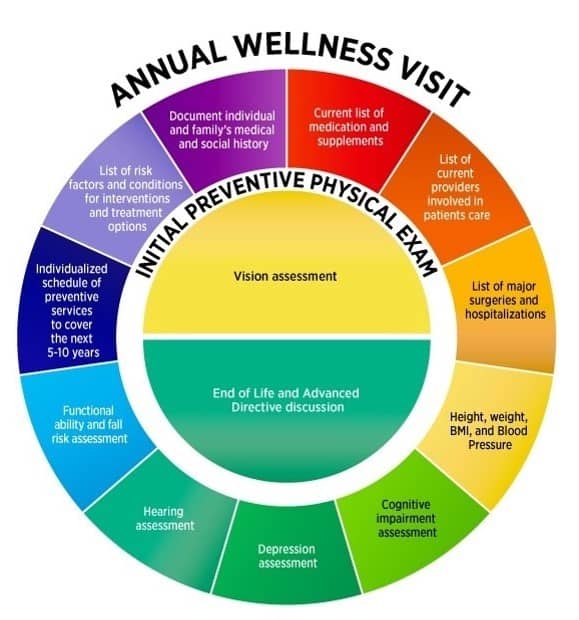
At the time of this writing, all non-essential medical visits have been rescheduled or cancelled. In our office we like to see our hearing aid patients for annual check-ups which allow us to monitor any hearing changes, review medical issues, review hearing aid programming and function to ensure maximum hearing ability. This type of appointment has also been rescheduled and considered non-essential but very important. We look forward to seeing these folks in the very near future.
The restriction on non-essential medical visit also applies to annual wellness with your primary care physician. The Medicare Annual Wellness Visit (AWV) was introduced in 2011 by the Centers for Medicare and Medicaid with intention of shifting the focus from acute medical problems to early identification.
Introduced as part of the Medicare Part B expansion under the Affordable Care Act, the AWV is for older adults who have Medicare Part B and starts the year following the “Welcome to Medicare” preventive visit, which takes place within the first 12 months of enrolling in Part B of Medicare.
In addition to routine biometric assessments, your physician has the option to use screening questionnaires to assess mood, falls risk, cognitive status, glaucoma, diabetes, and hearing status to name a few. Implementing the AWV has been a challenge with only few beneficiaries and health care practices participating.
Despite the increasing national attention being given to the risks posed by unidentified and untreated hearing loss, stakeholders-including primary care physicians (PCPs), caregivers, and patients- have yet to make any significant progress in improving earlier recognition of hearing loss. The reasons for the gap, I suspect, are complex; ranging from the belief that hearing loss is a normal part of aging to the perception that hearing interventions are costly and services inaccessible. (Not the case in either.)
We work closely with the PCPs in the area and know that most have hearing screeners in their office. Questionnaires about hearing ability can be challenging if the correct questions are not asked. You may be asked if you have any “hearing” concerns when the question should be asked if you have any “speech understanding” concerns.
When asked, most of our patients will say their hearing is fine; I just have trouble understanding what others are saying. This is because we have enough of the sounds of speech out of hearing range making it difficult to understand or we may mishear what is being said.
As we know, we don’t know what we don’t hear. For this reason, ask to have your hearing screened by your PCP. If needed a referral for a comprehensive diagnostic evaluation will be made.
As we reconnect with our PCPs for routine visits, keep in mind untreated hearing loss is associated with quality of life, depression, cognitive status (mild cognitive decline/dementia), increased risk of falls, depression and social isolation. Let us help you be the best you can be with diagnosis and treatment.
Jane, Beth, Jamie and I wish you and your families the best of health. Stay well and we look forward to seeing you soon. Feel free to visit our website: www.hearingsolutionsofnc.com and like us on Facebook. We will talk to you soon ((704) 212-2376.)
